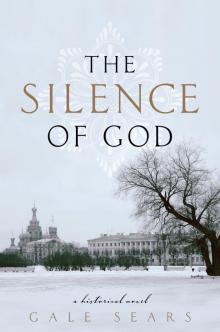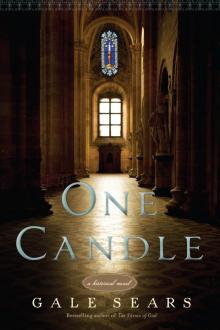- Home
- Gale Sears
One Candle Page 5
One Candle Read online
Page 5
Owning and reading the Bible showed the commitment of the Waldenese to follow the pattern of Jesus Christ and His followers in studying the gospel. During the time of the Waldenese and other religious reformers, the Catholic Church forbade these practices and severe punishments were meted out to those disobeying.
The deep regard held by the Waldenese for the scriptures is apparent in the education of their youth. While attention was given by the pastors to branches of general learning, the Bible was made the chief study. The young committed to memory the Gospels of Matthew and John along with many of the epistles. The youth were also employed in copying the scriptures.
The deathbed prophecy of John Combe, father of Pauline Combe and father-in-law of John Malan, was an actual occurrence written down by several family members who were present at the time.
The French Revolution began in 1789 and continued through the late 1790s, subsiding with the ascent of Napoleon Bonaparte. During these years of turmoil the French citizens revolted and restructured the political landscape, attacking the monarchy and feudal system while pressing for a more representative form of government.
Chapter Five
Salt Lake City
October 6, 1849
Eliza R. Snow broke away from the group of women with whom she’d been conversing about the church conference and crossed the courtyard to intercept her brother. “Elder Snow.”
He turned to her. “Sister Smith.”
She gave him an inclusive smile. “I will take a ‘dear sister’ from you, little brother, and be glad of it.”
He tipped his hat. “Dear sister.”
She gave him a hug. “So—called to be an apostle of the Lord eight months ago and now called to a mission.”
He nodded. “Both daunting assignments.”
“As they should be. It will keep you humble.” She considered his face. “Another mission for you across the great ocean.”
“It would seem.”
“Now that you are no longer a bachelor, I thought they would give you time to be with your wives and children.”
“Hmm.” He looked about. “Where is that family of mine, anyway?”
“They have abandoned you for the warm cabin. Charlotte told me to tell you. She also said that you are not to linger too long discussing things with the brethren.”
“She knows me well.”
Eliza put on her gloves and took her brother’s arm. “And I have been invited to your home for supper, so you may walk me.”
At that moment, several people came over to congratulate Elder Snow on his call and to wish him well. The last to approach was Joseph Toronto. He smiled broadly and shook Lorenzo’s hand with vigor. “I am blessed. So blessed. Going back to my home country to be a missionary. And to be working with such a good man. A smart man.”
“I will lean on you for the language, Brother Toronto.”
“Yes, I teach you. Italian is not so hard. And you help me with everything else.” He gave a little bow to Eliza. “Buonasera, Sorella Snow. Your brother, they keep him busy, no?”
“Yes, Brother Toronto, as you. There is no use for drones in the Lord’s kingdom.”
Brother Toronto’s eyes narrowed. “This word, drone. What means it?”
“A lazy bee.”
“Ah! The lazy bee. Oh, no, no, no! No lazy bees in Deseret.”
The three laughed, and Lorenzo patted Brother Toronto on the back. “I will see you tomorrow at the meeting.”
“Yes. Yes, of course. I am no drone.”
Lorenzo smiled. “No, you are not.” He and Eliza waved as Brother Toronto moved off. “A drone,” Lorenzo scoffed. “That man is one of the hardest workers I’ve ever encountered.”
Eliza looked up at her brother. “He came across with the first wagon train west, didn’t he?”
“He did. Thirty years old, and President Young called him to be the herdsman over all the cattle moving west.”
“You two are quite a pair,” Eliza said as they left the crowded street near the center and wended their way towards Lorenzo’s house.
“How do you mean?”
“You, tall and slender. He, short and solid. You, calm and thoughtful. He, full of energy and action. You, an American man of Pilgrim heritage. He, a man from the shores of Sicily. I think you will complement each other.”
He smiled at her. “At least we are near the same age—me thirty-five, and he thirty-three. And both with strong testimonies of the restored gospel.”
“That will be helpful,” Eliza said. “Wasn’t he a sailor in his young life?”
“He was. He traveled the world.”
“What a joy to gather all that knowledge and experience.”
“And a fair amount of money.”
“How did he come to the Church?”
“He heard the word preached when he was in port in Boston. He jumped ship and followed the Saints to Nauvoo.”
“That took faith,” Eliza said.
Lorenzo nodded. “Indeed. It was Nauvoo where I first met him. When he arrived in the city he came to the building committee and gave all his money for the building of the Nauvoo Temple.”
Eliza looked over in surprise. “Really?”
“Brother Toronto did not want it known.”
“Remarkable,” Eliza said as she waved to a friend. “The gospel net is drawing in the pure in heart from the world.”
“Speaking of the gospel and the world, what did you think of the congregation’s reaction to President Young’s announcement about the perpetual emigration fund?”
“I think it took their breath away.”
“Pure revelation.”
“Pure.”
A cool wind blew down from the canyon and Eliza stopped to secure more buttons on her coat. She looked over to the west, across the Great Salt Lake, where the sun was setting in orange streaks through billowing gray clouds. It had rained off and on during the day, and now that night was coming, the saturated air was chill. She took her brother’s arm again, continuing their conversation as though no pause had been made.
“Think how many of those without funds, those who have longed to gather with the Saints here in Zion, will now be able to come.”
Lorenzo nodded. “The gathering is a miracle.”
“What I find a miracle is that after only two years in the valley, we are sending missionaries out to the world.”
“Proselyting has never ceased since the restoration, Eliza. The Prophet Joseph sent out missionaries even in the darkest times.”
At the mention of her deceased husband’s name, Eliza stiffened. Lorenzo patted her hand. “I’m sorry. The pain is still great.”
“I miss him every day, Lorenzo. Every day.”
“Yes, there’s a hole in the fabric of our society that will not mend.” They walked in silence for a time. Finally Lorenzo spoke. “He would have loved being here with the Saints.”
Eliza nodded. “He would. Think of him helping to build the great city.”
“Or planting crops,” Lorenzo added.
“Or trying to get crops to grow in a desert with little water.” The two shared a brief laugh, and then Eliza sobered. “Oh, to have him here, receiving revelation and guiding us as he did at Nauvoo.”
“Yes. He was one of the earth’s great men. He and his brother Hyrum. ‘In life they were not divided, and in death they were not separated,’” Lorenzo quoted. He cleared his throat. “How blessed we were to know them. How very blessed.”
They walked for a time without speaking, then Eliza turned to her brother. “Do you remember when we first met Joseph?” she asked.
“Yes. Ohio. Our home in Mantua. I only met him briefly before leaving for Oberlin College.”
“That’s right. Well, Leonora and I thought him a common thing—a country bumpkin with little education.�
�
“Yes, the highly educated and accomplished Snow family condescending to listen to what the lowly yokel had to preach.”
A tear ran down Eliza’s cheek and she brushed it away. “Mother and Father were open to all thoughts and opinions, but Leonora and I held ourselves aloof.” Another tear. “Such arrogance. We had been searching for the primitive Church of Christ for years, and when it came pure to our ears, we were reluctant because of the preacher.”
“As I recall, you and Leonora were not reluctant for long.”
“Once I softened my prideful heart.”
Lorenzo chuckled. “Well, you were an intellect—a well-known poetess.”
“Oh, fiddle,” Eliza said. “He was a prophet of God.”
“He was,” Lorenzo said, the spirit of testimony in his voice. “Remember how I came from Oberlin College to Kirtland to visit you?”
“I do. You’d been studying Hebrew.”
“With a noted professor,” Lorenzo said, giving her a half grin. “And when I discovered that Hebrew was being studied by Joseph and others of the apostles of the Church at Kirtland, I decided to join them.”
Eliza grinned. “To show them up, if I remember correctly.”
“It didn’t take me long to come to know the spiritual brilliance of the Prophet,” Lorenzo said, shaking his head. “To think of all he accomplished in his brief life: ancient scripture translated, priesthood restored, thousands of converts gathered . . .”
“The building of the beautiful and ordered city of Nauvoo,” Eliza added.
Lorenzo nodded. “The beautiful city of Nauvoo crowned with a temple to the Most High God.”
“The power of eternal sealing,” Eliza said. She took a deep breath, and looked around at the hundreds of Saints wending their ways to their homes. “And the mobs thought by killing Joseph Smith that Mormonism would be crushed into oblivion.”
“Yet here we are,” Lorenzo countered.
“Yet here we are.” She looked up at her brother, taking him into her confidence. “Joseph often said to me that he knew the Church would go on—that even if something were to happen to him . . .” She took another breath, “That even if something were to happen to him, all would be well. If the keys were in place the Church would go on.”
“And expand into many parts of the world,” Lorenzo said.
She gave his arm a squeeze. “Italy is a long way away.”
Lorenzo nodded. As they turned onto a side road off the wide avenue, he could see the lights of his cabin home, and his heart ached. “It would be impossible to leave my family without the firm knowledge that I am doing the Lord’s work. To go to a country of such spiritual superstition without the testimony that I’m bringing them the light of the restored gospel? Impossible. But I know there are people waiting for the truth—praying for the truth.” He stopped and faced his sister. “Please look after my family for me, Eliza. I will not be here for the births that will come just months after I am gone, and . . .” His voice faltered.
Eliza took his hands. “You know, of course, that it is my calling to be Auntie Eliza? I will make sure that all your babies are protected and spoiled, and I will write you detailed descriptions of their beautiful faces and charming dispositions. Letters will be our lifeline.” She squeezed his hands. “As your older sister, I tell you to be at peace. The Lord is over all. Now, go and greet your wives with a smiling face and show them the trust you have of His infinite care.”
“I will take your counsel because you are so much older than me,” Lorenzo teased. Eliza began to protest, but he cut across her response. “And . . . and because trust in the Lord is the principle on which you live your life.”
“A much better reason.”
Lorenzo opened the door for his sister and followed her into the warmth and embrace of his family.
Notes
Lorenzo and his older sister Eliza were the offspring of solid Puritan stock. Their first paternal ancestor to reach America was Richard Snow, who settled in Woburn, Massachusetts, within two decades after the Pilgrim landing.
Eliza Snow was ten years Lorenzo’s senior. She joined the Church in 1835 and proved to be a strength and asset to it from the onset. She was a poetess of the highest caliber who penned more than 500 poems during her lifetime. Many of these poems became favorite hymns of the Latter-day Saints.
In the October 1849 general conference of the Church, President Young called three apostles to open missions abroad: John Taylor in France, Erastus Snow in Scandinavia, and Lorenzo Snow in Italy. Elder Franklin D. Richards was called to preside over the already established European Mission.
Chapter Six
Torre Pellice
December 24, 1849
Father Andrew stood facing his adversary, his walking stick raised to strike. The glow from the fire was the library’s only light, and it cast the two combatants in grotesque image.
“These . . . these statements are blasphemous!” Father Pious spluttered, holding out the parchments in a clenched fist.
“Hand those to me, or I will crack your skull!”
Father Pious retreated a step. “Why would you have these in your room? I thought you were someone to admire, but I’ve watched you. You think yourself above the rules—above the rest of us.”
Andrew swung the stick, but Father Pious sidestepped. Andrew glared at the insolent priest and steadied himself. “It is none of your concern, you toad! Why were you in my room?”
“I was ordered there to replace the straw in your mattress. That’s where I found these hidden away. Hidden instead of destroyed.”
“You have no say over them.”
“And neither do you. I came to deliver them to the fire where they belong.” He made a move for the fireplace and Father Andrew blocked him with his stick.
“Those are ancient parchments!”
“Which are heretical! There is no excuse you can give me,” Father Pious hissed, pushing past Andrew and hurrying forward to the fire.
“Stop!” Father Nathanael’s voice demanded as he came into the room. “What is this about?”
Father Nathanael’s abrupt command had momentarily stayed Father Pious’s hand, but now he scowled at Father Andrew, opened his fingers, and dropped the parchment into the flame.
“No!” Father Andrew bellowed as he stumbled forward.
Father Nathanael rushed past him, grabbed a corner of the vellum, and flipped it onto the hearthstone. He tapped out the flame with his sandaled foot.
“Carefully!” Father Andrew called to him. “Carefully.”
Father Pious glared at the two priests, but dared not go against Father Nathanael simply because he was cowed by his physical strength. “I will be reporting this to the Abbot,” he said, his voice strangled with anger.
The three turned abruptly to the library door as the Abbot and his assistant entered. The Abbot’s lined face was void of expression, but his stride into the room spoke purpose. Father Andrew glanced at his foe and saw a look of triumph light his face. Father Pious moved forward to intercept his superior, but the Abbot held up his hand.
“Never fear, Father Pious, I will get to the bottom of this.” He went to Father Andrew. “Report came to me of angry words being spoken in the library. Of course, I found this difficult to believe, as ours is an order where civility is expected.” His look flicked from the parchment on the hearthstone to the faces of the three priests. “Now I surmise that there may be a basis for the concern.”
“Your Holiness—” Father Pious began, but the Abbot again held up his hand to stop him. He turned. “Father Andrew?”
Though the Abbot was twenty years his junior, Andrew knew the deference owed his superior. He looked at him squarely. “Father Pious removed some ancient parchments from my room.”
“Heretical parchments,” Father Pious interjected.
The A
bbot ignored him and motioned for Andrew to continue.
“I was here in the library when Father Pious came in to burn them.”
The Abbot frowned. “Burn them?”
“Yes. Three-hundred-year-old parchments.”
Father Pious stepped forward. “But they were—”
Andrew cut him off. “I merely tried to stop him.”
The Abbot looked at the partially burned parchments and then to Father Pious. “I do not know what the policy was in Verona, Father Pious, but in our monastery, we do not burn parchments. We are stewards for the care of historical and sacred records.”
“But these are not sacred records, your Holiness. And I found them hidden under his mattress.”
The Abbot paused, and then turned to Father Andrew. “Explain this.”
“They are historical records of the Waldenese. I found them in the records room and wished to analyze the vellum and the archaic writing.”
Father Pious inched forward. “But why hidden? Perhaps he means to give them to his Waldensian friends.”
The Abbot held up his hand for the third time. “I believe I’ve received from you all the information I need, Father Pious. You are dismissed.”
“But—”
“You are dismissed.”
Father Pious took a last withering look at Father Andrew, bowed low to the Abbot, and exited.
The Abbot turned to his assistant. “Bring them to me.”
The priest moved immediately to retrieve the scorched manuscript.
Father Andrew watched as flecks of ash fell from the parchment as it was lifted. He closed his eyes in resignation. He saw himself sitting at his kitchen table in Lyon, writing out his letters with the white quill pen.
“I can teach you, Mama. I can teach you your letters.”
“What need I with those?”
“But everything is in letters, Mama. Everything.”
“Will it help me make a better pot of soup?”
“Father Andrew, I find much here which troubles me.”
Father Andrew opened his eyes to see the Abbot reading the parchment. Before thinking he said, “Yes, it troubles me also.”

 The Silence of God
The Silence of God Letters in the Jade Dragon Box
Letters in the Jade Dragon Box One Candle
One Candle